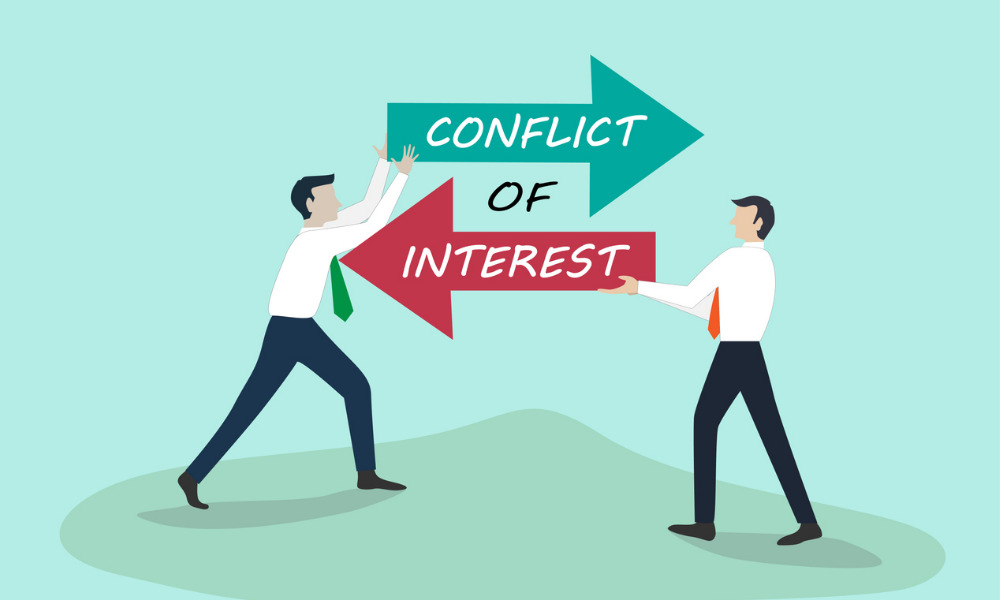
What constitutes a conflict of interest? Employment lawyer weighs in

BBC chairman Richard Sharp recently resigned from his post after a report found he’d “failed to disclose potential perceived conflicts of interest” over supposed dealings with then Prime Minister Boris Johnson.
In his resignation statement, Sharp clarified that failing to inform a panel about his involvement was inadvertent – adding that he acted with “the best of intentions”.
The issue of conflict of interest is a complex one for employers – but one that’s seemingly on the rise in larger corporations.
A survey from CIPD found that 38% of employees have witnessed a conflict of interest at work - with a report from EY adding that 56% of employees say conflicts of interest are either not well-managed or not managed at all in their organization.
According to Lorenzo Lisi, partner at Aird & Berlis, conflict of interest is a broad term.
“Conflict of interest is a fairly broad term that could, and should, deal with any number of possible conflicts as they relate to employment,” he tells HRD. “It could be nepotism, hiring or promoting someone you know; self-dealing in a financial role; using insider knowledge to an employees’ advantage. Or it can be something as simple as accepting gifts from vendors”.
It’s for this reason, understanding what conflicts an employee or potential employee might have, that specific provisions addressing conflict of interest are included in employment agreements.
“And further, why properly drafted conflict of interest policies are so important,” says Lisi.
Along with clear provisions in an employment agreement, most employers should have a robust conflict of interest policy, Lisi tells HRD. The policy should provide an overview of what exactly constitutes a conflict of interest, and include examples of potential conflicts of interest.
“It should clearly set out what a conflict is, or might be, and most importantly, make it a condition that an employee has obligation to disclose any potential issues that exist and as they arise,” he says. It should also set out a proper investigation process in the event of any alleged breach, which should be both specific and allow for an employee response.”
And a failure to draft a conflict of interest policy can mean incurring pretty hefty costs. A study by the Association of Certified Fraud Examiners found that the average loss due to occupational fraud (which includes conflicts of interest) was $125,000 per case. This figure increased to $150,000 per case for organizations with fewer than 100 employees.
A properly drafted policy requires an employee to disclose any specific or potential conflicts of interest. If the employee is aware of the conflict of interest requirements, and it is later discovered that they are in breach of those obligations, it could lead to discipline and possible termination.
“The clear requirement for a disclosure of a conflict is important” says Lisi. “For example, while the obligation not to disclose confidential information or compete against your employer is generally a requirement of employment, expanding on the obligation to make the employer aware of potential conflicts such as operating a competing business, or accepting gifts or favours from suppliers is something that not only promotes good governance, but avoids future problems.
“However, ensuring that employees acknowledge and understand these requirements is paramount - whether that be through a provision in an employment agreement, or a conflict of interest policy, or both.”
A survey of corporate directors conducted by the National Association of Corporate Directors found that conflicts of interest were the second most commonly reported board governance challenge, after cybersecurity. This suggests that the issue is growing - especially as remote work continues and workers are often taking on second careers, often without their employer’s knowledge.
If you believe that an employee is engaging in a potential conflict of interest, Lisi says you need to invoke your internal policy immediately.
“Make a determination in accordance with your policy,” he tells HRD. “Much the same as in any employer policy, such as an harassment and discrimination policy, there’s an obligation on an employee to comply.”
When it comes to firing an employee because of a conflict of interest, the outcome very much depends on the specific facts of the case at hand.
“If an employer determines that an employee or an executive has been involved in insider trading to their financial benefit, or an employee is financially involved with a company that competes against the company they're working for, that may be an offence which justifies a termination for cause,” says Lisi.
The important thing here, adds Lisi, is to have a clear policy, with guidelines as well as a process for determining what may have occurred.
For employers looking to prevent any future conflict of interest issues, it begins with an effective policy and appropriate policing of employee conduct. The stakes can be quite high, and the obligation to act can be immediate. Here, an ounce of prevention is worth a pound of cure.
What are your concerns around handling conflict of interests in organizations? Tell us in the comments below.